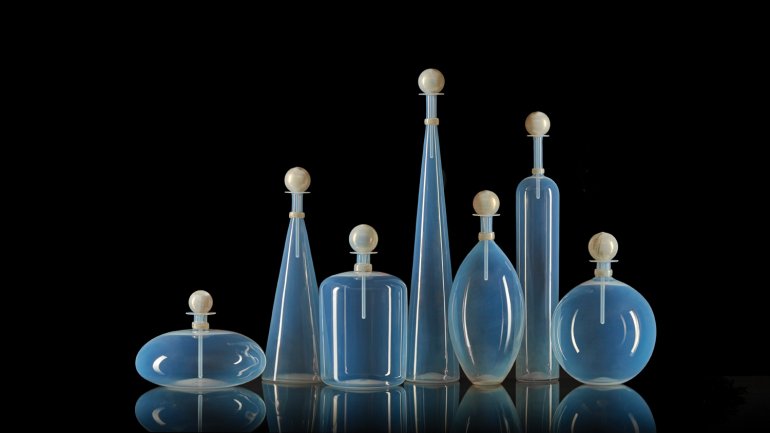Pure Harmony
Pure Harmony
When Josie Gluck and Michael Schunke established their glass studio in 2011, they sought a name that would express the ethos behind their exquisitely refined forms, handblown in the hybrid Venetian-American style in which they both were trained. They settled on Vetro Vero – in Italian, “true glass.”
“We wanted the name to capture the essence of who we are, how we operate, and what we create,” says Gluck. The meticulous artists honor tradition while pursuing contemporary style – and always focus on the purity of their material. “It speaks to the values we share and pursue: clarity, integrity, purpose.”
Intoxicating blends of form and color, Vetro Vero designs highlight the unique qualities of glass, in finely calibrated expressions of translucency and opalescence. Sleek bottles, pitchers, and other vessels come in a rainbow of seductive shades, from muted tones of amethyst and sage to bright cerise and deep cobalt, with accents in gold leaf. Collectors often display them in overlapping arrangements, creating landscapes of color and silhouette.
While much of their work can be considered functional, most of it falls into the realm of sculpture, particularly their pattern vessels, the creation of which is almost a devotional practice. That painstaking and time-consuming process results in objects that combine an energetic beauty of surface confined within rigorous form.
“So much of contemporary life is fast and disposable, on demand, or ‘in the cloud,’ ” observes Gluck, whose work explores the human connection to objects and the meaning we imbue them with. With that in mind, she and Schunke have modeled Vetro Vero as “a practice that brings value and harmony to the everyday.”
Partners personally as well as professionally (“I tell people we make glass and dinner,” Gluck jokes), the two live in an 1898 farmhouse in a small village about an hour’s drive southwest of Philadelphia. Next door, in their studio building (once a dairy), they tend to every aspect of the business, from design and production to packing and shipping. Their collaboration is easy and natural, tapping their complementary strengths. He has an eye for precision and contour, she a knack for details and color – although, Gluck notes, “Michael has an exceptional sense of value and density. I’m stronger with hue and saturation.”
Their shared obsession is a commitment to technical expertise in the service of creative innovation. “I’ve always been drawn to the idea of searching for excellence through practice and repetition,” says Schunke, 47, who ran his own successful studio, Nine Iron, for 17 years before Vetro Vero. “When I was in high school, my parents went to conference night, and my art teacher told them, ‘He’s a perfectionist.’ My father responded, ‘No, he’s not – Michael just wants it the way he wants it.’ That was a small thing, but pivotal for me. It made me realize early on that it’s OK to not be overly concerned with what other people think of my approach to making. I’ve drawn on that experience for years.”
Gluck, 39, had a similar epiphany, back in her days as a glass student in the early 2000s. “I was making cylinders, because my teacher told me if I could make a nice cylinder, I could make anything.” She asked a pair of artists, known for their colorful, folk-inspired sculptures, to critique “my very best, very boring, clear, straight, even cylinder,” she recalls. “One of them asked me, ‘Why do you want to make this stuff?’ I remember being so nervous, but the words presented themselves: ‘I want to be good at what I do.’ I was relieved when they accepted my answer, but I also didn’t care. I felt like I had found a voice.” She went on to pursue her practice in Seattle (where she assisted Dale Chihuly and Lino Tagliapietra, among others); after various sojourns elsewhere for school and work, she eventually moved to Pennsylvania to work with Schunke.
Today, the couple enjoys an integrated lifestyle that revolves around the work they love. They travel and teach at prominent schools such as Penland and Pilchuck. To relax and recharge, he likes to cook and go fly-fishing; she gardens, does yoga, or works on Experience Design, her line of glass-inspired coloring books. They also maintain individual practices: He creates a signature line of artful goblets, while she experiments with mixed media and conceptual works.
And always, at the end of each busy week, they take time out for pizza night, usually joined by Schunke’s kids, Ben, 19, and Sarah, 15. “When we first came together, we started making pizzas every Friday in the studio. Things can get chaotic, and we needed a rhythm, a pattern in our lives,” Gluck says of what has become a cherished tradition. “It’s something simple, regular, and very special.”

